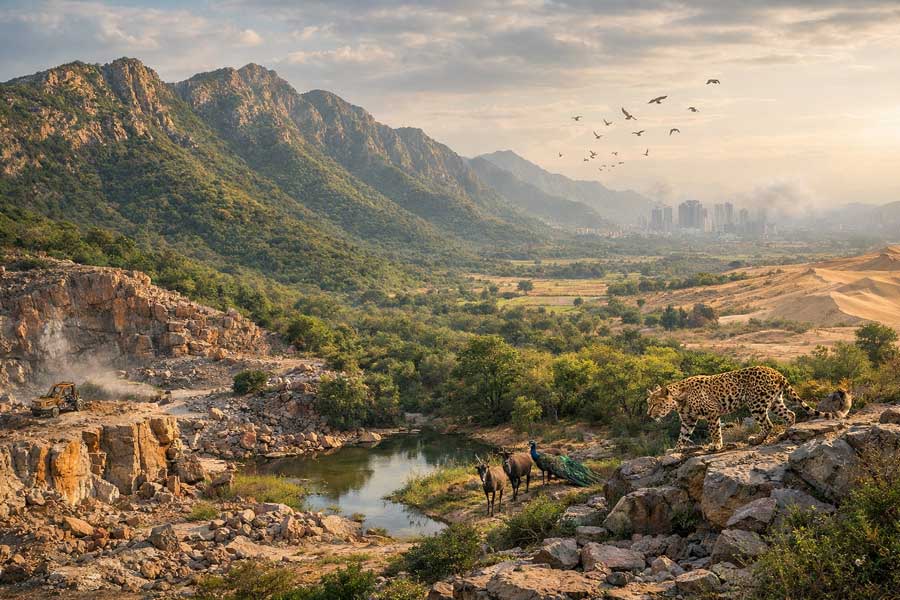Role of Psychology in the Forest and Environment Management
INTRODUCTION
Humans have an innate ability to understand the behavior of others within a social context. Historically, this ability has played a significant role in safeguarding forests and the environment. The key principle guiding this conservation effort was frugality-using natural resources wisely to ensure their availability for future generations. In early human civilization, greed was not a predominant factor; however, with the advancement of comfort and convenience, insatiable greed emerged, leading to excessive and imbalanced consumption of natural resources.
This situation called for the intervention of professionals who could enhance mental resilience and promote sustainable behavior. This necessity led to the emergence of psychologists as key figures in addressing environmental challenges.
In the early 1960s, the publication of Silent Spring (1962) by Rachel Carson acted as a catalyst for the modern environmental movement. Environmental concerns gained traction, eventually leading to the establishment of organizations like the Environmental Protection Agency (EPA) in the United States. Similarly, in India, then-Prime Minister Indira Gandhi attended the Stockholm Conference on the Human Environment in 1972, where she emphasized that poverty was a major cause of environmental degradation. For the first time, the conference crystallized the idea that environmental integrity, peace, and development are interdependent and that civil society’s participation is crucial for addressing environmental issues.
Indira Gandhi played a pioneering role in environmental conservation, spearheading legislative and policy initiatives for environmental protection. During her tenure, several environmental acts and regulations were enforced, highlighting the growing significance of environmental governance.
Psychologists gained prominence in mitigating the impact of climate change and environmental degradation, leading to the emergence of environmental psychology. This field focuses on the interrelationship between humans and their environment. Pioneers like Harold Proshansky, William Ittelson, and Robert Bechtel contributed significantly to its development.
During the 1990s and early 2000s, the psychological aspects of environmental conservation gained further recognition. Scholars such as Stephen Kaplan and Rachel Kaplan played a crucial role in advancing conservation psychology, which emphasizes behavioral changes to promote sustainability.
Several theories and concepts in environmental psychology offer valuable insights into fostering a sustainable mind set. These include:
- Biophilia Hypothesis – The idea that humans have an inherent connection to nature and that nurturing this connection can enhance environmental stewardship.
- Restoration Theory – The notion that exposure to nature can restore cognitive functions and improve mental health, thereby encouraging sustainable behaviors.
- Environmental Identity – The concept that integrating environmental concerns into personal identity can lead to more consistent pro-environmental actions.
Climate change has already caused irreversible damage, manifesting in more frequent cyclonic activities, cloud bursts, landslides, avalanches, glacier melting, species extinction, and an increase in respiratory diseases. These changes have disrupted social harmony on a global scale. If immediate action is not taken, the restoration of environmental balance will become nearly impossible.
This is the crucial moment for psychologists to take decisive action. By addressing public attitudes and emotions, psychologists can drive behavioral changes necessary for forest and environmental conservation. Adopting a mission-mode approach, psychologists can help transcend national boundaries to create a collective movement toward sustainable living.

UNDERSTAND HUMAN BEHAVIOR AND ENVIRONMENT:
- Psychologist can help to design effective strategies to promote sustainable practices.
- Psychologist can Address the environmental issues.
- Psychologist can Encourage the people for positive interaction with natural environment.
- Psychologist is helpful in identifying barriers to pro-environmental behavior and developing intervention.
KEY ROLE OF A PSYCHOLOGIST:
- Understanding environmental attitudes and perception.
- Understanding how people perceive environmental issues, and their belief about climate change.
- Devise communication strategies to change the belief system of public and their general perception.
DESIGNING EFFECTIVE COMMUNICATION STRATEGIES:
- Analyze the factors like denial, perceived lack of control, or belief that individual action do not matters, which can hinder the people from liking environmentally responsible action.
- Identifying psychological barriers to pro-environmental behavior.
PROMOTE ECO-FRIENDLY DECISION MAKING:
Psychologists can guide policymakers in designing policies and incentives that encourage sustainable choices by leveraging insights on cognitive biases and social norms. This includes strategies like framing messages effectively, using default options, and creating social incentives to promote pro environmental behavior.
COMMUNITY ENGAGEMENT AND OUTREACH:
- Psychologists can facilitate community outreach by organizing workshops that address environmental issues, promote conservation efforts, and foster a sense of collective responsibility.
- Through education and engagement, they encourage sustainable behaviors and active participation in environmental initiatives.
NATURE BASED INTERVENTION:
Psychologists can promote the benefits of spending time in nature through programs like forest therapy. These programs, such as Japan’s forest bathing for school children, help improve mental health and build a stronger connection to the environment.
ASSESSING ENVIRONMENTAL-MENTAL HEALTH NEXUS:
Psychologists can study how environmental damage, natural disasters, and climate change affect mental health. They can also develop strategies to help people cope and build resilience.
SPECIFIC AREAS OF INTERVENTION:
- Risk Perception: Studying how visual landscapes, like urban forests, influence people’s emotions and environmental awareness.
- Environmental Aesthetics: Using psychological principles to promote conservation and protect biodiversity through design and engagement.
ROLE OF AN ENVIRONMENTAL PSYCHOLOGIST:
- Encouraging Behavioral Change: Helping people adopt eco-friendly habits.
- Promoting Environmental Solutions: Raising awareness about sustainable practices.
- Fostering Pro-Environmental Behavior: Motivating individuals to act responsibly toward nature.
- Re-evaluating Human-Nature Relationships: Understanding and improving our connection with the environment.
- Encouraging Sustainable Living: Supporting lifestyles that reduce environmental impact.
- Creating a Better Planet: Ensuring a healthier and more sustainable world for future generations.
URBANIZATION & HUMAN-NATURE CONNECTION:
- Large-scale industrialization and urbanization have negatively impacted the relationship between humans and the natural environment (Soga & Gaston, 2015).
- The fast-paced modern lifestyle leaves little time for individuals to enjoy a fulfilling life, making aging a major concern, particularly in China and Korea. This shift affects people’s attitudes, emotions, and behaviors toward nature, creating a cycle of disconnection.
- Kesbir and Kesbir (2017) found a decline in references to nature in cultural products such as fiction, books, films, and song lyrics since the 1950s, suggesting that this trend may contribute to a reduced sense of curiosity, respect, and concern for nature.
ROLE IN ENVIRONMENTAL LAW ENFORCEMENT:
- Legal Support & Court Proceedings – Preparing pre-sentence reports for courts and advising on the best methods for interviewing suspects and cross-examining witnesses.
- Criminal Profiling – Utilizing psychological theories and research to develop offender profiles, aiding in tracking and apprehending wildlife criminals.
- Understanding Wildlife Crime Networks – Analyzing how organized wildlife crime operates under sophisticated supply chain systems, often rivaling multinational businesses.
- Global Impact & Interpol’s Role – Addressing the biodiversity, economic, and social threats posed by wildlife crime, with international agencies like Interpol playing a key role in dismantling these networks.
KEY CHALLENGES IN ENVIRONMENTAL ADVOCACY:

- Interdisciplinary Collaboration – Bridging the gap between legal, scientific, and policy perspectives through joint initiatives, workshops, and cross-sector partnerships.
- Funding Limitations – Seeking diverse funding sources such as grants, private sector sponsorships, and innovative financial models like carbon credits or green bonds.
- Public Resistance – Utilizing behavioral science, social marketing, and community engagement strategies to encourage sustainable habits.
- Psychological Impacts of Climate Change – Addressing eco-anxiety through awareness campaigns, mental health support, and resilience-building initiatives.
CONCLUSION:
- Expanding Opportunities: Psychology plays a vital role in sustainability and conservation.
- Interdisciplinary Need: Collaboration with scientists and policymakers is essential.
- Behavioral Impact: How we think and act shapes the future of our planet.
- Forensic Role: Psychology aids in addressing wildlife offenses.
About Me
- Renowned Conservationist & Former IFS Officer – Served in the Indian Forest Service (1989 batch) for over 30 years.
- Expert in Forest Governance & Wildlife Protection – Held key leadership roles, including Principal Chief Conservator of Forests (Protection), Madhya Pradesh.
- Acclaimed Author & Researcher -Authored books on biodiversity, endemic species, and indigenous knowledge.
- Continued Impact Post-Retirement -Actively engaged in research, policy development, and global conservation advocacy.
- Visionary Leader in Sustainability -Committed to preserving India’s natural heritage through innovation and strategic initiatives.













